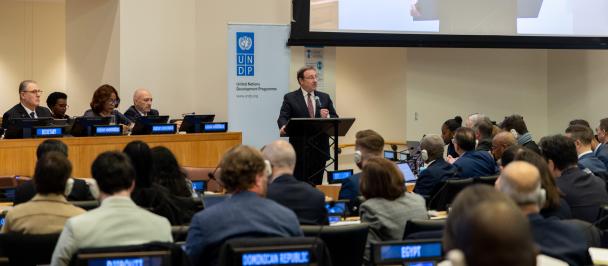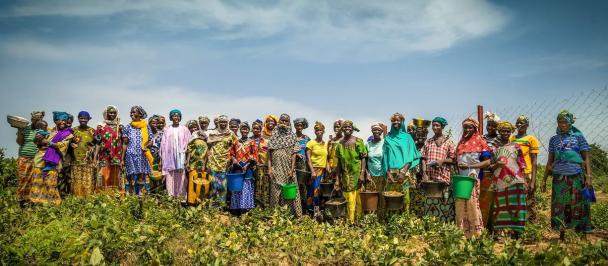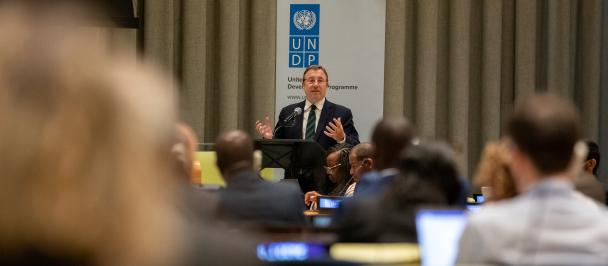Welcoming remarks at HLPF Side Event on “Multi Stakeholder Partnership for Tackling Social Vulnerability”
Multi Stakeholder Partnership for Tackling Social Vulnerability
July 15, 2019
As prepared for delivery.
H.E. Isidoro Santana, Minister of Economy, Planning and Development, Dominican Republic
H.E. Alejandra Candia, Vice Minister, Social Development, Chile
H.E. Jacqueline Plass, Program Executive Director, Chile
H.E. Rebeca Grynspan, Secretary-General, SEGIB
Agustín Delgado, Chief Sustainability Officer, Iberdrola
Heerad Sabeti, World Economic Forum – CEO of the Fourth Sector Group,
Distinguished Speakers, Colleagues and Friends,
I am very pleased to join this side event on how a meaningful collaboration among Government, civil society and the private sector is instrumental for advancing the Sustainable Development Goals (SDGs). As you all already know, the SDGs represent a very ambitious collective endeavor—and meeting the goals will require a “whole of society” approach. In my brief remarks today, I will focus on the importance of collaborating with the private sector as a key actor in tackling social vulnerability.
While Latin America and the Caribbean has become mainly a middle-income region, it has not yet become a middle-income society.
Despite important gains in poverty reduction, millions of families across the region remain vulnerable.
In the Latin America and Caribbean region at UNDP, we speak about the path to achieving the SDGs and consolidating our region as a strong, cohesive middle-class society as a “three-lane road”. These three lanes are productivity, inclusion, and resilience. These three, we propose, should also be addressed through the lens of environmental sustainability as a fundamental objective.
Today I am going to focus on the first two lanes: productivity and inclusion–as the private sector has a critical role in ensuring that these two lanes are flowing in the same direction. Indeed, productivity and inclusion are jointly determined.
Indeed, while economists often worry about “efficiency-equity” trade-offs or “efficiency-sustainability” tradeoffs, —we know that it is possible to find “win-win” solutions. Not only is it possible to do so, it is necessary to do so.
According to recent survey data from SEGIB , 91% of Ibero-Americans think that “if the private sector does not change its way of acting and develops a fairer and more sustainable model, next generations will live worse than their parents.”
It is clear that citizens are increasingly aware and intolerant of a “business-as-usual” approach and changing the way our markets function will be necessary if we are going to meet the SDGs. Indeed, according to the same survey, two thirds of Ibero-Americans believe that companies should be contributing to the SDGs.
It is not just citizens who feel this way. Leaders across the private sector are increasingly seeing the business case for sustainable development and looking to the SDGs as a “cornerstone to secure economic and business growth […] offer[ing] the greatest economic opportunity of a lifetime.”
To put this into numbers, the Business and Sustainable Development Commission (BSDC) found that business opportunities in the implementation of the SDGs could be worth more than US$12 trillion annually for the private sector in 2030 (representing 10 percent of forecasted global output in that year).
Rebeca Grynspan will elaborate on this, but let me also highlight the economic significance of purpose-driven companies in terms of GDP and employment. They account for 4% to 7% of the GDP in countries such as Argentina, Brazil or Mexico; and 8% of employment in Spain or Portugal.
Iberdrola is an example of the type of companies that have understood their need to stand up and effectively transform the way they conduct business. The SDGs need to be integrated into core strategies and operations of companies of all sizes to ensure that economic and social benefits from business activities are maximized and negative impacts minimized. The fact that this company invested over 100 billion in in renewable energies, networks and storage in the 2000s has made it one of the leaders in renewable energy and headwind production.
Returning to the our “three-lane road” of productivity, inclusion, and resilience, I want to emphasize that these roads can only be paved through effective governance. Thus, it is critical that societies establish an enabling environment to foster purpose-driven companies whose main purpose is to create and provide solutions to social and environmental challenges. This type of enabling environment requires the development of platforms to foster trust and collective action between public, private and civil society stakeholders.
In this regard, I would like to share our ongoing partnership with SEGIB and the Fourth Sector Group. Building on previous efforts, over the last two years we have been creating a global platform to accelerate the development of supportive ecosystems for purpose-driven companies. We are working with several universities, companies and institutions to advance a proposal to Governments to consider the appropriate legal, normative and fiscal frameworks that would support rather than penalize purpose-driven companies by properly acknowledging their contributions.
Both the Dominican Republic and Chile represent two examples in our region of the potential for change in this area by bringing diverse together stakeholders to strengthen their national ecosystems for purpose-driven companies to thrive.
Last June, Minister Santana of the Dominican Republic provided the closing remarks of the II Forum “From business sustainability to Sustainable Development” in Santo Domingo. Not only did Impact Investors, Dominican companies, IFC, IADB and all major chambers and business associations attend the event, but ten institutions signed an agreement on financing for development focused on industry, housing, infrastructure, energy and construction. These efforts are part of the recent SDGs and Private Sector Platform established by UNDP in the Dominican Republic.
In Chile, the government has been moving this agenda forward with the recent “Compromiso País” initiative that they will be sharing today. I want to take this opportunity to congratulate them on this effort, which represents remarkable progress in bringing together diverse stakeholders to tackle the challenge of social vulnerability.
• Following a bottom-up approach, the first steps of the initiative included identifying vulnerable groups and launching a “call to action” to Chilean society. Among the wide range of identified groups are: 500 thousand women who are victims of intra-family violence and have no personal incomes to survive; more than 35% of the population over 18 years old who didn’t finish secondary school; 1.4 million out of 18 million inhabitants who lack basic sanitation and/or drinkable water; over 42 thousand families living in slums; and 72 thousand students that are not attending school.
• This consultation led to the definition of 16 priorities to be solved by some of the most relevant leaders of all sectors of our society, including main representatives of large corporations and the business sector in general, all of whom committed publicly to design collaborative solutions for those critical social problems at a fast pace.
• Finance solutions were also defined and structured, including pure public financing, philanthropy and other forms and types of private capital sources.
In conclusion, let me reiterate that the SDGs will only be achieved if they are part of a collective effort. Making progress on our “three-lane road” requires new ideas and new partnerships.
We cannot solve our problems with the same thinking we used when we created them.
Examples such as the ones discussed today represent the potential for new solutions in tackling social vulnerability that can result when diverse stakeholders come together.
At UNDP, we are fully committed to strengthening and advancing our collaboration with governments, civil society and companies.
Our work on supporting appropriate ecosystems for purpose-driven companies to thrive has only begun.

 Locations
Locations


